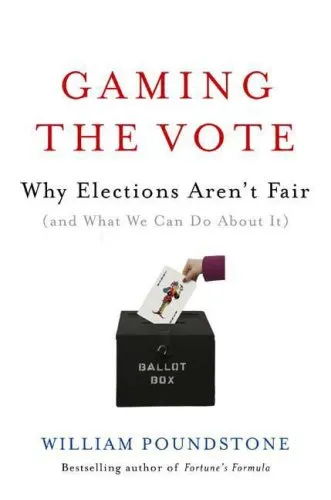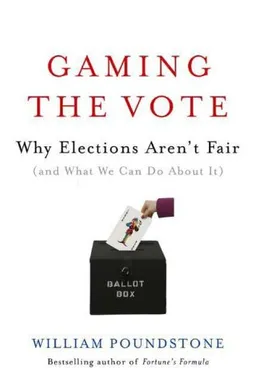Our Electoral System is Fundamentally Flawed, But There’s a Simple and Fair Solution
At least five U.S. presidential elections have been won by the second most popular candidate. The reason was a “spoiler”—a minor candidate who takes enough votes away from the most popular candidate to tip the election to someone else. The spoiler effect is more than a glitch. It is a consequence of one of the most surprising intellectual discoveries of the twentieth century: the “impossibility theorem” of Nobel laureate economist Kenneth Arrow. The impossibility theorem asserts that voting is fundamentally unfair—a finding that has not been lost on today’s political consultants. Armed with polls, focus groups, and smear campaigns, political strategists are exploiting the mathematical faults of the simple majority vote. In recent election cycles, this has led to such unlikely tactics as Republicans funding ballot drives for Green spoilers and Democrats paying for right-wing candidates’ radio ads. Gaming the Vote shows that there is a solution to the spoiler problem that will satisfy both right and left. A system
called range voting, already widely used on the Internet, is the fairest voting method of all, according to computer studies. Despite these findings, range voting remains controversial, and Gaming the Vote assesses the obstacles confronting any attempt to change the American electoral system. The latest of several books by William Poundstone on the theme of how important scientific ideas have affected the real world, Gaming the Vote is a wry exposé of how the political system really works, and a call to action. William Poundstone is the bestselling author of ten nonfiction books, including Labyrinths of Reason and The Recursive Universe, both of which were nominated for the Pulitzer Prize. At least five U.S. presidential elections have been won by the second most popular candidate. The reason was a “spoiler”—a minor candidate who takes enough votes away from the most popular candidate to tip the election to someone else. The spoiler effect is more than a glitch. It is a consequence of one of the most surprising intellectual discoveries of the twentieth century: the “impossibility theorem” of Nobel laureate economist Kenneth Arrow. The impossibility theorem asserts that voting is fundamentally unfair—a finding that has not been lost on today’s political consultants. Armed with polls, focus groups, and smear campaigns, political strategists are exploiting the mathematical faults of the simple majority vote. In recent election cycles, this has led to such unlikely tactics as Republicans funding ballot drives for Green spoilers and Democrats paying for right-wing candidates’ radio ads. Gaming the Vote shows that there is a solution to the spoiler problem that will satisfy both right and left. A system called range voting, already widely used on the Internet, is the fairest voting method of all, according to computer studies. Despite these findings, range voting remains controversial, and Gaming the Vote assesses the obstacles confronting any attempt to change the American electoral system. The latest of several books by William Poundstone on the theme of how important scientific ideas have affected the real world, Gaming the Vote is a wry exposé of how the political system really works, and a call to action. “Poundstone always writes with the premise that thinking can be entertaining. His latest book, Gaming the Vote, clearly reasoned, well-researched, and often amusing, deals with the crucially important question: How best does a government ‘by the people’ decide what to do? He does not find a definitive answer, but he shows why it is so difficult and prepares the citizen to face the question responsibly.”—Rush Holt, U.S. House of Representatives (NJ-12)
"Americans’ most recent encounter with 'the spoiler effect' was in 2000, when Ralph Nader diverted enough votes from Al Gore in Florida, at least one poll suggested, to tip the election to George W. Bush. By Poundstone’s reckoning, four other presidential races were probably skewed by minor-party candidates—'an 11 percent rate of catastrophic failure,' he writes . . . Poundstone, the author of 10 previous books, has the popular science writer’s knack for wrapping difficult material in enticing anecdotes. How can you not be seduced by a book that uses the Hot or Not Web site to illustrate range voting?"—Mick Sussman, The New York Times Book Review
"William Poundstone's Gaming the Vote arrives amid unusually high reader interest in equitable voting. And Mr. Poundstone is a clear, entertaining explicator of election science. He easily bridges the gaps between theoretical and popular thinking, between passionate political debate and cool mathematical certainty."—Janet Maslin, The New York Times
"Gaming the Vote is about the problem of an election system that selects Candidate B when a majority would have preferred Candidate A. The book's author, William Poundstone, is not a political guy. He is a science writer. He writes not with a partisan's bile but with a technician's delight in explaining all the ways our democracy can give us what we don't want . . . This is a book that goes down easily. The reader who likes puzzles, math and politics will especially enjoy it . . . Poundstone is not a social scientist showing off but a storyteller."—Bruce Ramsey, The Seattle Times
“Poundstone always writes with the premise that thinking can be entertaining. His latest book, Gaming the Vote, clearly reasoned, well-researched, and often amusing, deals with the crucially important question: How best does a government ‘by the people’ decide what to do? He does not find a definitive answer, but he shows why it is so difficult and prepares the citizen to face the question responsibly.”—Rush Holt, U.S. House of Representatives (NJ-12)
“In 1948 economist Kenneth Arrow dropped a bombshell on political scientists. He proved that no voting system can be perfect. Poundstone’s eleventh book is a superb attempt to demystify Arrow’s amazing achievement, and to defend ‘range voting’ as the best voting system yet devised. His account is interwoven with a colorful history of American elections, from the corrupt politics of Louisiana to Ralph Nader as the ‘spoiler’ whose splitting of the Democratic votes helped elect George W. Bush. A chapter covers Lewis Carroll’s little-known valiant efforts to solve the voting problem. A raft of amusing political cartoons enliven Poundstone’s prose. There is no better introduction to the inescapable flaws and paradoxes of all voting systems than this eye-opening, timely volume.”—Martin Gardner, author of Are Universes Thicker than Blackberries? and more than 60 other titles
“Gaming the Vote is a witty, irreverent tour d’horizon of voting theories, voting theorists, and their quarrels. Unlike many academic brouhahas, the stakes here are high. Both citizens and politicians will delight in the tales Poundstone tells, but it won't always be easy to tell who’s right. Nevertheless, Poundstone cuts through a lot of the obfuscation and takes sides, which won’t please everybody.”—









